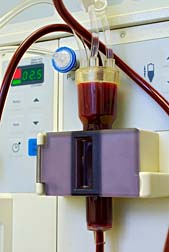 The study, published in the April 18 issue of the Journal of the American Medical Association, found that for-profit centers increased patients' Epogen doses even if the patients already had recommended red blood cell levels. Researchers blame the problem on Medicare.
The study, published in the April 18 issue of the Journal of the American Medical Association, found that for-profit centers increased patients' Epogen doses even if the patients already had recommended red blood cell levels. Researchers blame the problem on Medicare.Medicare paid two billion dollars for Epogen in 2005, more than any other drug, and for-profit dialysis centers say that Epogen brings in between 20 and 25 percent of their annual operating revenue. According to researchers, Medicare reimburses dialysis centers for each treatment and also separately for Epogen. Some for-profit chains can also negotiate volume discounts from Epogen's maker, meaning that they spend less on the drug than Medicare reimburses them, leaving the centers with a profit.
Anemia drugs like Epogen are used to prevent blood transfusions for patients suffering from anemia, which often occurs concurrently with kidney failure. Earlier this year a black box warning was added to Epogen to reflect the increased risk of death.
Epogen, Procrit, and Aranesp are all erythropoiesis-stimulating agents (ESAs) that work by stimulating the bone marrow to make more red blood cells, reducing the need for blood transfusions. They are used on patients with chronic kidney failure, patients using chemotherapy to treat cancer, patients scheduled for major surgery, and patients who use AZT to treat HIV. Much of the trouble with anemia drugs is related to off-label uses, such as in patients with cancer who were not receiving chemotherapy.
Problems associated with Epogen, Procrit, and Aranesp include increased risk of death, stroke and heart attack. There is also concern that use of the anemia drugs could result in enhanced tumor growth. Patients who receive higher doses over longer periods of time are at a higher risk. Doctors have been warned to give patients the lowest possible dosage that still prevents drug transfusions.
Meanwhile, concerns about anemia drugs are spreading through other parts of the world. Europe's drug agency announced in April that it was conducting a safety review of anemia drugs. The safety review was ordered because of reports of "an increased risk of serious cardiovascular complications in patients with chronic renal failure and a possible effect on tumor progression in cancer patients," according to an announcement by the European Medicines Agency.
A research group from Northern Ireland has also warned against over-aggressive use of anemia drugs. A commentary, published in the April issue of The Oncologist, states that recent studies have researchers concerned that ESAs could increase the risk of death in cancer patients and may "enhance thrombosis, tumor growth, and neovascularization."




